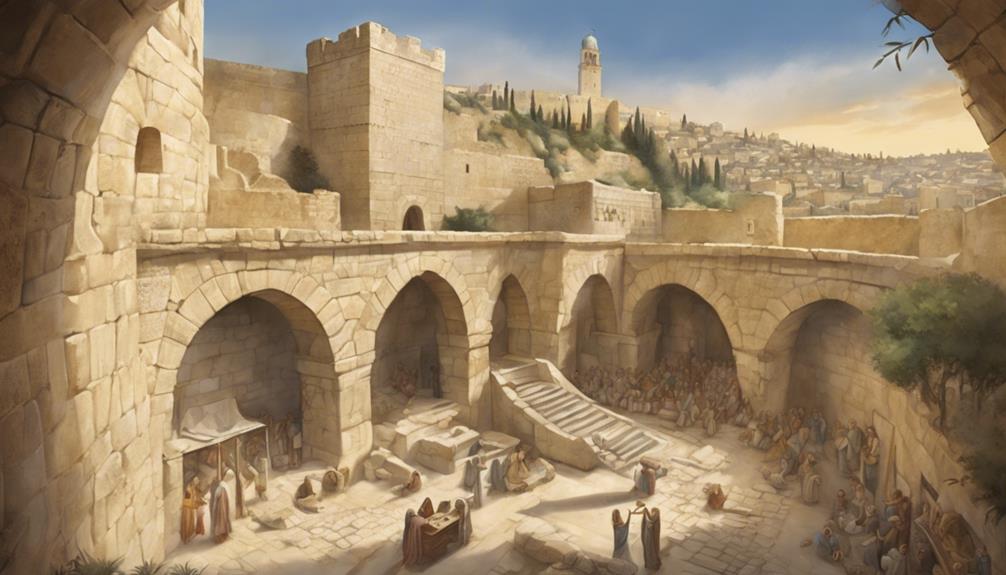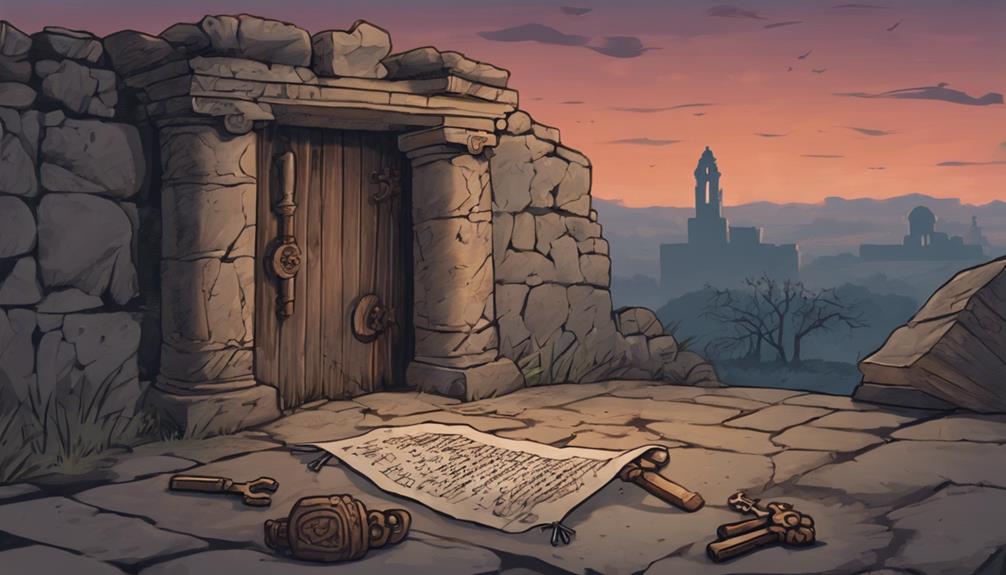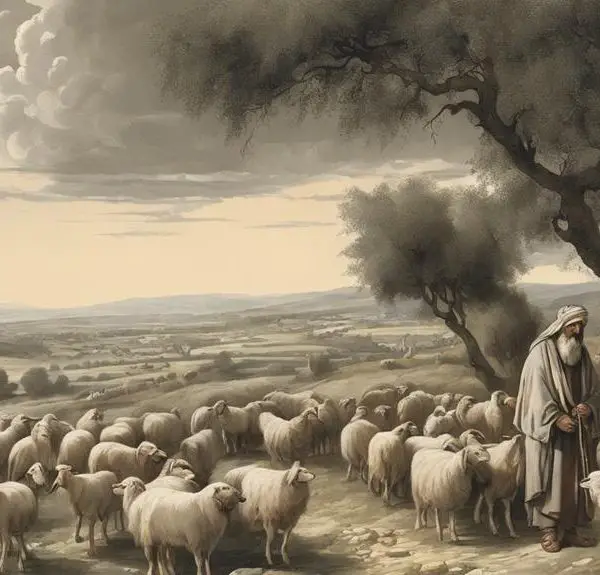The tale of Shebna in the Bible unveils a dramatic fall from grace, stirring curiosity about pride's consequences and the fleeting nature of power.

Who Is Shebna in the Bible
Just as a coin has two sides, Shebna's story in the Bible serves as a powerful lesson on the consequences of pride and the impermanence of status.
You might find yourself intrigued by Shebna, a high-ranking official who faced a dramatic downfall, as foretold by the prophet Isaiah.
His role and title, wrapped in the complexities of ancient politics and divine judgment, hint at a narrative rich with historical and moral layers.
As you explore Shebna's story, consider the lasting implications of his actions and their relevance today, leaving you to ponder the delicate balance between power and humility.
Key Takeaways
- Shebna served as a high-ranking official managing the king's household in ancient Judah.
- His actions and pride led to a direct prophecy against him, signaling divine disapproval.
- Shebna's downfall illustrates the consequences of ignoring divine guidance and ethical leadership principles.
- His story serves as a cautionary tale about the dangers of pride and the importance of humility in leadership.
The Historical Context

To understand Shebna's role in biblical history, it's essential to examine the political and social landscape of Judah during the 8th century BCE. This era marks a critical juncture, heavily influenced by the expansionist policies of the Assyrian Empire. Assyrian influence in the region wasn't merely military; it seeped into the political, economic, and cultural facets of neighboring states, including Judah. You'll find that Jerusalem's politics during this period were intricately tied to its relationship with Assyria.
Judah, aiming to maintain its sovereignty, navigated a complex web of diplomacy and tribute. The ruling class in Jerusalem, including figures like Shebna, faced the daunting task of balancing Assyrian demands with the need to preserve their own political authority and the social fabric of Judah. This balancing act was precarious. Assyrian hegemony meant that any misstep could result in military retribution, which would destabilize Jerusalem's politics and society. Thus, understanding the Assyrian influence provides crucial context for comprehending the decisions and dilemmas faced by Judah's leaders, including Shebna, in this turbulent period.
Shebna's Role and Title

Understanding the Assyrian influence provides crucial context for Shebna's position within Judah's political hierarchy, where he held a significant title and played a pivotal role. As a key figure, Shebna's responsibilities were vast, indicating not only his high status but also his extensive administrative skills. His role, however, wasn't without controversy, largely due to his pride, which is hinted at in biblical texts.
Here are some critical aspects of Shebna's role and title:
- Held a significant administrative position: Shebna was entrusted with managing the king's household, a role akin to a modern-day chief of staff.
- Displayed considerable administrative skills: His ability to oversee palace operations and possibly other governmental functions speaks to his competency.
- Exhibited a notable level of pride: This trait is inferred from biblical passages, suggesting that his demeanor might've contributed to his eventual downfall.
- Influenced by Assyrian politics: The geopolitical climate, dominated by Assyrian power, likely shaped his approach to governance and diplomacy.
- Faced internal and external challenges: Navigating the complexities of Judah's political landscape, Shebna had to contend with both internal dissent and external threats.
These elements underline Shebna's intricate role within Judean society, marked by his influential position and the challenges it entailed.
The Prophecy Against Shebna

Amid his prominent role within Judah's hierarchy, Shebna's actions led to a direct prophecy against him, highlighting the inevitable consequences of his pride and mismanagement. This prophecy, deeply rooted in divine intervention, serves as a stark warning against the dangers of hubris in positions of power. It underscores the belief that leadership is a stewardship, entrusted by the divine, and should be exercised with humility and accountability.
The political intrigue surrounding Shebna's position only adds complexity to his story. The prophecy against him isn't merely a personal rebuke but a critical commentary on the ethical and moral responsibilities of leaders. It reflects the intertwined nature of religion and politics in ancient Judah, where divine will was seen as central to the legitimacy of political authority.
Through Shebna's example, you're invited to consider the broader implications of leadership that strays from its righteous path. The narrative suggests that divine intervention serves as a corrective force, realigning the moral compass of leaders who've lost their way. In essence, Shebna's story is a cautionary tale about the dangers of pride and the importance of aligning political actions with higher moral and ethical standards.
The Downfall of Shebna

Reflecting on the prophecy against him, Shebna's eventual downfall becomes a pivotal moment in understanding the consequences of failing to heed divine warnings and the importance of humility in leadership. His story is a testament to pride's consequence and a moral failure that serves as a cautionary tale.
- Pride's consequence: Shebna's downfall was precipitated by his excessive pride, leading to his displacement. This underscores the peril of hubris in positions of authority.
- Divine warnings: Ignoring the divine warning delivered through the prophet Isaiah, Shebna's fate was sealed, illustrating the critical importance of heeding spiritual admonitions.
- Moral failure: His actions not only reflected personal ambition but also a profound moral failure, impacting his legacy and position.
- Humility in leadership: Shebna's story emphasizes the value of humility. His lack thereof ultimately led to his downfall, highlighting humility as a key virtue for leaders.
- Consequences of ignoring divine guidance: The narrative of Shebna reinforces the outcomes of disregarding divine guidance, serving as a lesson for all, especially those in leadership.
Analyzing Shebna's narrative provides deep insights into the dangers of pride and the significance of moral integrity in leadership.
Lessons From Shebna's Story

Analyzing Shebna's story reveals essential lessons on the dangers of pride and the paramount importance of humility and obedience in leadership roles. Shebna's fall underscores how pride can't only lead to personal downfall but also affect those under one's stewardship. Leadership humility, therefore, emerges as a critical virtue, emphasizing that leaders are servants to their people, not rulers lording over them.
Pride's consequences in Shebna's narrative highlight the delicate balance required in leadership positions. You're reminded that authority should be wielded with a sense of responsibility and a deep commitment to the welfare of others, rather than as a means to personal gain or glory. This story serves as a cautionary tale, illustrating that those in positions of power are held to a higher standard and that deviations from this path can lead to severe repercussions, both personally and professionally.
In essence, Shebna's story is a poignant reminder of the timeless truth that leadership is a service, not a pedestal. It calls you to reflect on your own actions and motivations, encouraging a leadership style marked by humility, empathy, and a steadfast commitment to the greater good.
Frequently Asked Questions
How Is Shebna's Name Spelled in Different Biblical Translations, and What Are Its Variations?
You'll find Shebna's name spelled variously across different biblical translations, reflecting both name origins and translation discrepancies. These variations arise from attempts to accurately transcribe the original Hebrew into other languages.
Scholars delve into these differences to understand the historical and linguistic context better. For example, some versions might use 'Shebnah,' while others stick closer to 'Shebna.'
Each variation offers insights into the translation practices and priorities of different periods and communities.
Are There Any Archaeological Findings or Inscriptions That Have Been Linked to Shebna?
You're diving into a fascinating area with your inquiry about archaeological findings connected to Shebna. Yes, there's actually something known as the Shebna inscription, which has sparked quite a bit of archaeological controversy.
This artifact, believed to be linked to the biblical figure, has stirred discussions among scholars about its authenticity and historical significance. Analyzing these debates offers a deeper understanding of how ancient inscriptions can illuminate historical and biblical narratives.
What Are the Different Scholarly Interpretations Regarding Shebna's Nationality or Ethnic Background?
You're diving into a complex topic, exploring various scholarly interpretations about Shebna's nationality or ethnic background.
Scholars analyze Shebna's role and the political implications it might've had, considering the historical and cultural context of the era.
This analysis isn't just about identifying his roots; it's about understanding the broader socio-political landscape he was a part of.
Each interpretation offers a unique lens, shedding light on the intricate tapestry of historical narratives.
How Has Shebna Been Portrayed in Religious Art, Literature, and Other Cultural Expressions Throughout History?
In exploring how Shebna's depicted in cultural expressions, you'll notice modern adaptations and artistic symbolism play key roles. Artists and writers have often used Shebna's story to explore themes of power and downfall, embedding these narratives with varied interpretations.
Artistic depictions range from literal to abstract, each offering a unique lens. This portrayal evolution reflects changing societal values and scholarly insights, enriching our understanding of historical and religious narratives.
Can the Story of Shebna Be Correlated With Any Other Historical Figures or Events Outside the Bible?
You're diving into whether there's a Shebna comparison or historical correlation with figures or events outside the Bible. Analytically speaking, it's a complex task.
Historical records from ancient civilizations may offer parallels, considering the roles and downfalls of similar high-ranking officials or advisers.
You'd need to scrutinize archaeological findings, ancient texts, and scholarly interpretations to identify any concrete links.
This approach ensures an informed and scholarly analysis of potential correlations.
Conclusion
In analyzing Shebna's narrative, you confront a cautionary tale of pride and downfall within a historical and prophetic framework. His story underscores the peril of self-aggrandizement and the inevitability of divine justice. It teaches you the importance of humility and the transient nature of earthly power.
Through Shebna's example, you're reminded that positions of influence are entrusted by God and should be wielded with integrity, lest you face a similar fate of disgrace and replacement.



Sign up